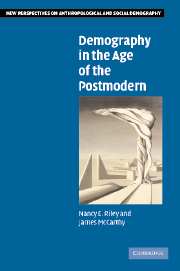Book contents
- Frontmatter
- Contents
- Acknowledgments
- 1 Introduction: why examine demography?
- 2 A brief introduction to postmodernism
- 3 The essentials of demography
- 4 A genealogy of demography
- 5 Demography's place in the social sciences
- 6 Feminist demography
- 7 Postmodern perspectives in demography
- 8 Some final thoughts
- Notes
- References
- Index
5 - Demography's place in the social sciences
Published online by Cambridge University Press: 05 June 2012
- Frontmatter
- Contents
- Acknowledgments
- 1 Introduction: why examine demography?
- 2 A brief introduction to postmodernism
- 3 The essentials of demography
- 4 A genealogy of demography
- 5 Demography's place in the social sciences
- 6 Feminist demography
- 7 Postmodern perspectives in demography
- 8 Some final thoughts
- Notes
- References
- Index
Summary
The best minds in university-based population studies were, and remain, preoccupied with the task of elevating demography to the status of a distinct and academically recognized independent discipline. The road in that direction is marked by impressive scientific achievements, but it has also led to a loosening of ties and diminishing interaction with neighboring social science fields.
(Demeny 1988: 477)The character of the field of demography and its strengths and weaknesses, its emphases and silences, are highlighted when it is examined in the light of neighboring fields. This perspective allows us glimpses into several issues which are related to those we have been discussing: how different demography is from other social science fields, the kinds of materials, insights, and research taking place in neighboring fields that are available to demography, and how broadening and varying epistemological and methodological approaches might give demography tools to strengthen understandings of demographic behavior. It provides further insights as to why demography is not involved in the issues and directions that are seen as cutting edge in most of social science. While we cannot go into great depth in all of these areas of discussion, we hope that we can outline some of the work taking place in neighboring fields, and, in addition, some of the writing from demographers and non-demographers alike about the connections between demographic concerns and other social sciences.
- Type
- Chapter
- Information
- Demography in the Age of the Postmodern , pp. 81 - 98Publisher: Cambridge University PressPrint publication year: 2003



